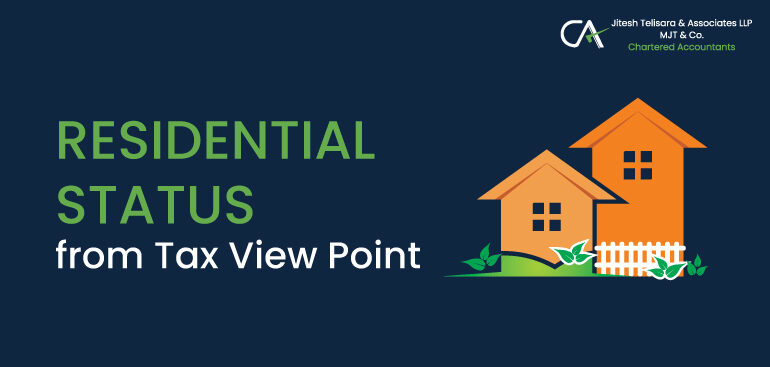Income Tax Act, 1961 of India applies to all persons having income earned or accrued in India. However, its applicability differs basis the residential status of a person. The residential status as stated in Income Tax Act should not be considered as a synonym for citizenship of India.
As per Income Tax Act, an Indian citizen can be a Non-resident or a Foreign Citizen can be a resident for applicability of the Income Tax Act. Income Tax laws are applied to a person for calculating taxes basis the residential status of such person. Hence, the residential status of a person is of vital importance for Income Tax Act. As per the Income Tax Act, a person can be a resident or a non-resident.
Conditions for residential status
As per the Income Tax Act, a person is regarded as a resident of India if such person qualifies the below-mentioned criteria:
- If such person is in India for 182 days or more (either at one time or in aggregate) in the previous year;
OR
- If such person is in India for 60 days or more (either at one time or in aggregate) in the previous year and has been in India for a period of 365 days (either one time or in aggregate) in four years preceding the previous year.
Exceptions
- In case of a person who is a citizen of India, leaves India in any previous year for the purpose of employment as a member of the crew under the Merchant Shipping Act or for the purpose of employment outside India, the second condition of residential status shall be considered to 182 days instead of 60 days.
- In case of a person who is a citizen of India or a person of Indian Origin, being outside India, comes on a visit to India in any previous year, the second condition of residential status shall be considered to 182 days instead of 60 days. However, if such a person of Indian origin has total income excluding the income from foreign sources, which exceeds Rs 15 Lakhs during the previous year, the second condition of residential status shall be considered to 120 days instead of 60 days.
Ordinarily Resident or Not Ordinarily Resident?
Once a person’s residential status qualifies as ‘resident’, it is important to understand further if such a person is ‘Ordinarily Resident’ or ‘Not Ordinarily Resident’. A person is said to be not ordinarily resident if the following criteria are met:
- If such person has been a non-resident in 9 out of the 10 previous years immediately preceding previous year;
OR
- Such person has been in India for a period of 729 days or less (either at one time or in aggregate) in seven years previous years immediately preceding the previous year.
Inclusion:
- A citizen of India or a person of Indian Origin having total income other than income from foreign sources, exceeding Rs 15 lakhs, and such person has been in India for 120 days or more but less than 180 days in the previous year, such person shall be treated as Resident- Not Ordinarily Resident.
- A citizen of India with income other than foreign sources exceeding Rs 15 lakhs and if such income is not taxable in any other country for any reason such as residential status or domicile, such person shall be treated as Resident- Not Ordinarily Resident.
In other words, a person shall be considered as a Resident – Ordinarily Resident if such person
- Is resident for at least 2 out of 10 previous years immediately preceding the previous year; and
- Has been in India for 730 days or more during the 7 previous years immediately preceding the previous year.
Other Key Points
- To calculate the number of days stay in India, the date of departure from India as well as the date of arrival in India should be included in the total number of days stayed in India.
- In a case where an income is being taxed in India as well as in another country, such a person can resort to the Double Taxation Avoidance Agreement (DTAA).
Jitesh Telisara & Associates LLP, CA In Viman Nagar is a professionally managed firm catering to domestic and international clients with a broad range of services in domestic and international taxation, regulatory and advisory services and crosses border transaction-related services.
The team at the firm has dedicated and experienced professionals and associates like Chartered Accountants, Company Secretary and Consultants to provide end to end services to your business. With the effort of gaining a deep understanding of your business, the team is committed to providing valuable, consistent and efficient services based on its in-depth knowledge and wide experience in the areas of audit, taxation, regulatory compliances, and related business services.
Our services: GST Consultant, IT returns consultant, Corporate law, Taxation, Regulatory & Advisory Services

